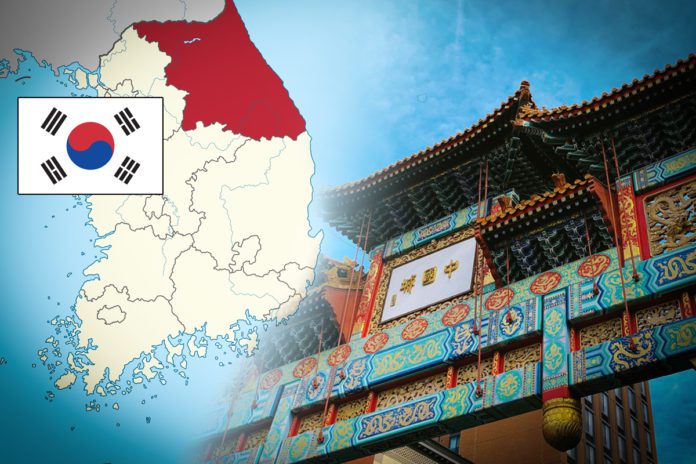A construction project for a Korea-China Cultural Town in Gangwon Province in northeastern South Korea is being reconsidered due to growing opposition over the perception that China is attempting to exert cultural sway over South Korea.
According to the Gangwon provincial government on April 26, Kolon Global Corp, which is leading the project, said in a statement that it will reconsider the whole project. “We do recognize that proceeding with the Korea-China Cultural Town project would not be possible,” Kolon Global’s statement said. “The project was to build (a) tourism complex with various themes, such as traditional and modern cultures of South Korea and China. Its purpose was not to create a Chinatown.” The company added that it needs to consider (the) feelings of the roughly 650,000 people who signed a Blue House (South Korea’s White House) petition calling for the project to be canceled.
On March 29, the petition titled “Scrap the Chinatown Construction in Gangwon,” was filed with the Blue House. The petitioner was referring to the 1.2 million-square meter (296 acres) Chinese culture-themed development in Hongcheon, Gangwon.
“Why do we need a Little China in Korea?” the petitioner wrote. “This is the Republic of Korea. Even if it is correct that the relationship and cooperation between South Korea and China are important, I just cannot agree with this kind of thinking.”
The petition received over 662,000 signatures as of April 26. If more than 200,000 people sign a petition within 30 days of it being filed, the Blue House or an appropriate administrative branch needs to provide a statement regarding the issue.
The Blue House petition said, “People are worried that China’s Northeast Project, which is getting worse by the day, will result in the loss of our cultural identity and independence.” Launched by the Chinese Academy of Social Sciences and financially supported by the Chinese government, the Northeast Project was a research project that ran from 2002 to 2007 on the history and current situation of the frontiers of northeastern China.
The project caused ire in South Korea for claiming that ancient Korean kingdoms in northeastern China were Chinese polities because of their location within the borders of the modern Chinese state. Chinese attempt to distort history have continued until today. Recently, Chinese authors and scholars have been saying that Korean cultural products such as hanbok (traditional Korean clothing) and foods like kimchi originated in China.
“It is time to confront China, which keeps trying to steal unique aspects of our culture, such as kimchi and hanbok,” said the Blue House petition.
In an interview with the Korean online version of the People’s Daily, the official newspaper of the Chinese Communist Party’s Central Committee, Gangwon Gov. Choi Moon-soon said, “This town will be a cultural town to introduce the thousands of years of Chinese culture in all its depth and diversity to Gangwon and the world, and we will make every effort to ensure that the cultural content representing China is well-designated.” Choi even said the project was a “One Belt, One Road” of culture, a reference to China’s international infrastructure project, for which he was heavily criticized by the public.
Choi was criticized over another interview with a local newspaper in Gangwon Province on April 16. “Even if there are more than one million signatures to the petition, that petition still is based on fake news,” he said. He argued that most of the funding is coming from the private sector and that it is not a “Chinatown,” since its purpose is not to bring in Chinese to live there, but to have them visit the region. He even argued that residents of Gangwon are not against the project.
His remarks led to another Blue House petition, which appeared on April 16. It called for the impeachment of Gov. Choi for his role in the project and the response he made to media. It criticized Choi’s statements about fake news, and said, “Citizens are the owners of the liberal democratic Republic of Korea, and no one can push ahead with this project as long as citizens do not agree with it.” The petition received over 63,000 signatures as of April 26.
The original project aimed to create a cultural tourism district featuring a K-pop museum and a Korean Wave video display, a traditional Chinese-style garden, and a Chinese food experience zone. The initial plan was to attract Chinese tourists and investors by enabling mutual cultural exchanges between the two countries.
The project was initiated in late 2018 and construction was expected to be finished in 2022. The total budget needed for the project was around 1 trillion won ($899 million), according to domestic media outlets.
The issue shows that there is growing anti-Chinese sentiment among South Koreans due to various reasons, including Beijing’s distortion of historical facts. The South Korean public also has been very sensitive about Chinese cultural infringement led by massive inflow of capital.
One of the latest examples of this sentiment was the cancellation of drama “Joseon Exorcist” after just two episodes. Viewers were upset over the historical distortions in the show, which included its depiction of a king of the Korean Joseon dynasty providing Chinese foods, such as mooncakes, to a guest. At that time, the critics were mostly males in their 20s and 30s who are relatively more opposed to China than other demographic groups.


